Women Empowerment Towards SME Development in India's Economy
VerifiedAdded on 2022/12/29
|67
|24691
|2
Report
AI Summary
This report examines the conceptual framework and research methodology used to understand the contribution of women's empowerment towards the development of Small and Medium Enterprises (SMEs) in India. It discusses various research philosophies, including positivism, and approaches such as deductive, inductive, and abductive methods. The research strategies cover experiments, action research, case studies, surveys, observations, grounded theory, and interviews. Data collection methods include qualitative, quantitative, and mixed methods, with a focus on descriptive, experimental, explanatory, correlation, and diagnostic research designs. The report also details the use of questionnaires for data collection, sampling techniques, data analysis methods like descriptive and inferential statistics, and ethical considerations, ultimately aiming to provide insights into the role of women in India's economic development within the SME sector.
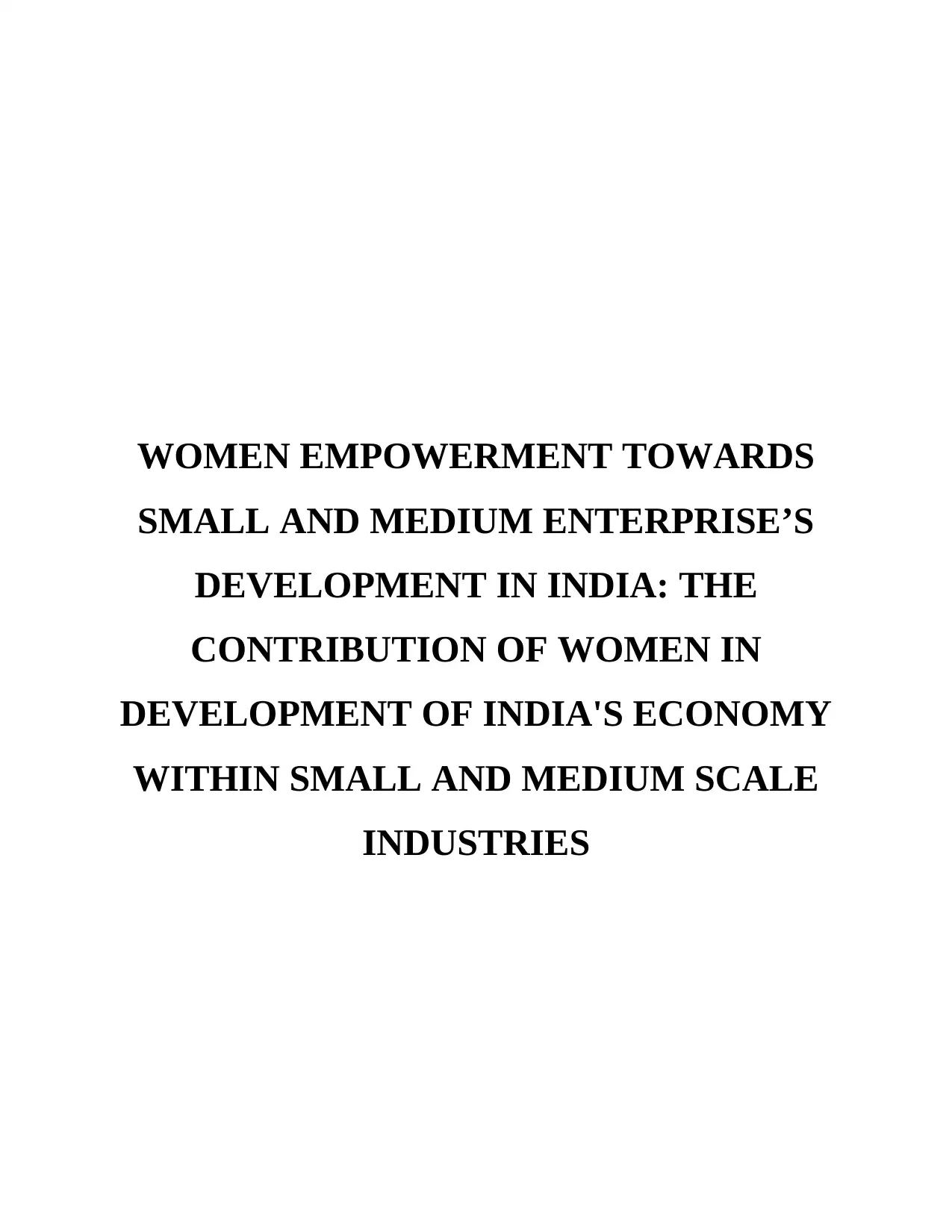
WOMEN EMPOWERMENT TOWARDS
SMALL AND MEDIUM ENTERPRISE’S
DEVELOPMENT IN INDIA: THE
CONTRIBUTION OF WOMEN IN
DEVELOPMENT OF INDIA'S ECONOMY
WITHIN SMALL AND MEDIUM SCALE
INDUSTRIES
SMALL AND MEDIUM ENTERPRISE’S
DEVELOPMENT IN INDIA: THE
CONTRIBUTION OF WOMEN IN
DEVELOPMENT OF INDIA'S ECONOMY
WITHIN SMALL AND MEDIUM SCALE
INDUSTRIES
Paraphrase This Document
Need a fresh take? Get an instant paraphrase of this document with our AI Paraphraser
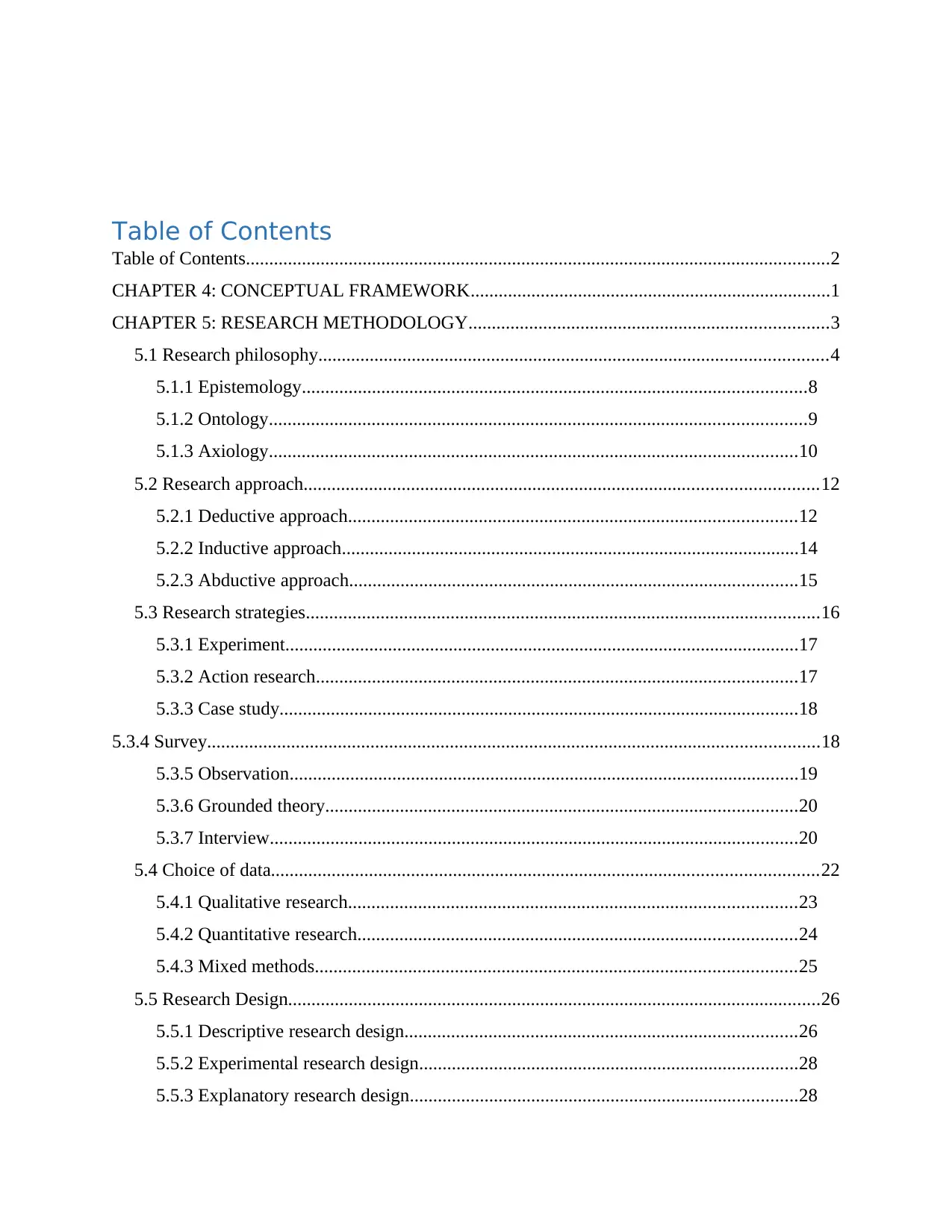
Table of Contents
Table of Contents.............................................................................................................................2
CHAPTER 4: CONCEPTUAL FRAMEWORK.............................................................................1
CHAPTER 5: RESEARCH METHODOLOGY.............................................................................3
5.1 Research philosophy.............................................................................................................4
5.1.1 Epistemology............................................................................................................8
5.1.2 Ontology...................................................................................................................9
5.1.3 Axiology.................................................................................................................10
5.2 Research approach..............................................................................................................12
5.2.1 Deductive approach................................................................................................12
5.2.2 Inductive approach..................................................................................................14
5.2.3 Abductive approach................................................................................................15
5.3 Research strategies..............................................................................................................16
5.3.1 Experiment..............................................................................................................17
5.3.2 Action research.......................................................................................................17
5.3.3 Case study...............................................................................................................18
5.3.4 Survey...................................................................................................................................18
5.3.5 Observation.............................................................................................................19
5.3.6 Grounded theory.....................................................................................................20
5.3.7 Interview.................................................................................................................20
5.4 Choice of data.....................................................................................................................22
5.4.1 Qualitative research................................................................................................23
5.4.2 Quantitative research..............................................................................................24
5.4.3 Mixed methods.......................................................................................................25
5.5 Research Design..................................................................................................................26
5.5.1 Descriptive research design....................................................................................26
5.5.2 Experimental research design.................................................................................28
5.5.3 Explanatory research design...................................................................................28
Table of Contents.............................................................................................................................2
CHAPTER 4: CONCEPTUAL FRAMEWORK.............................................................................1
CHAPTER 5: RESEARCH METHODOLOGY.............................................................................3
5.1 Research philosophy.............................................................................................................4
5.1.1 Epistemology............................................................................................................8
5.1.2 Ontology...................................................................................................................9
5.1.3 Axiology.................................................................................................................10
5.2 Research approach..............................................................................................................12
5.2.1 Deductive approach................................................................................................12
5.2.2 Inductive approach..................................................................................................14
5.2.3 Abductive approach................................................................................................15
5.3 Research strategies..............................................................................................................16
5.3.1 Experiment..............................................................................................................17
5.3.2 Action research.......................................................................................................17
5.3.3 Case study...............................................................................................................18
5.3.4 Survey...................................................................................................................................18
5.3.5 Observation.............................................................................................................19
5.3.6 Grounded theory.....................................................................................................20
5.3.7 Interview.................................................................................................................20
5.4 Choice of data.....................................................................................................................22
5.4.1 Qualitative research................................................................................................23
5.4.2 Quantitative research..............................................................................................24
5.4.3 Mixed methods.......................................................................................................25
5.5 Research Design..................................................................................................................26
5.5.1 Descriptive research design....................................................................................26
5.5.2 Experimental research design.................................................................................28
5.5.3 Explanatory research design...................................................................................28
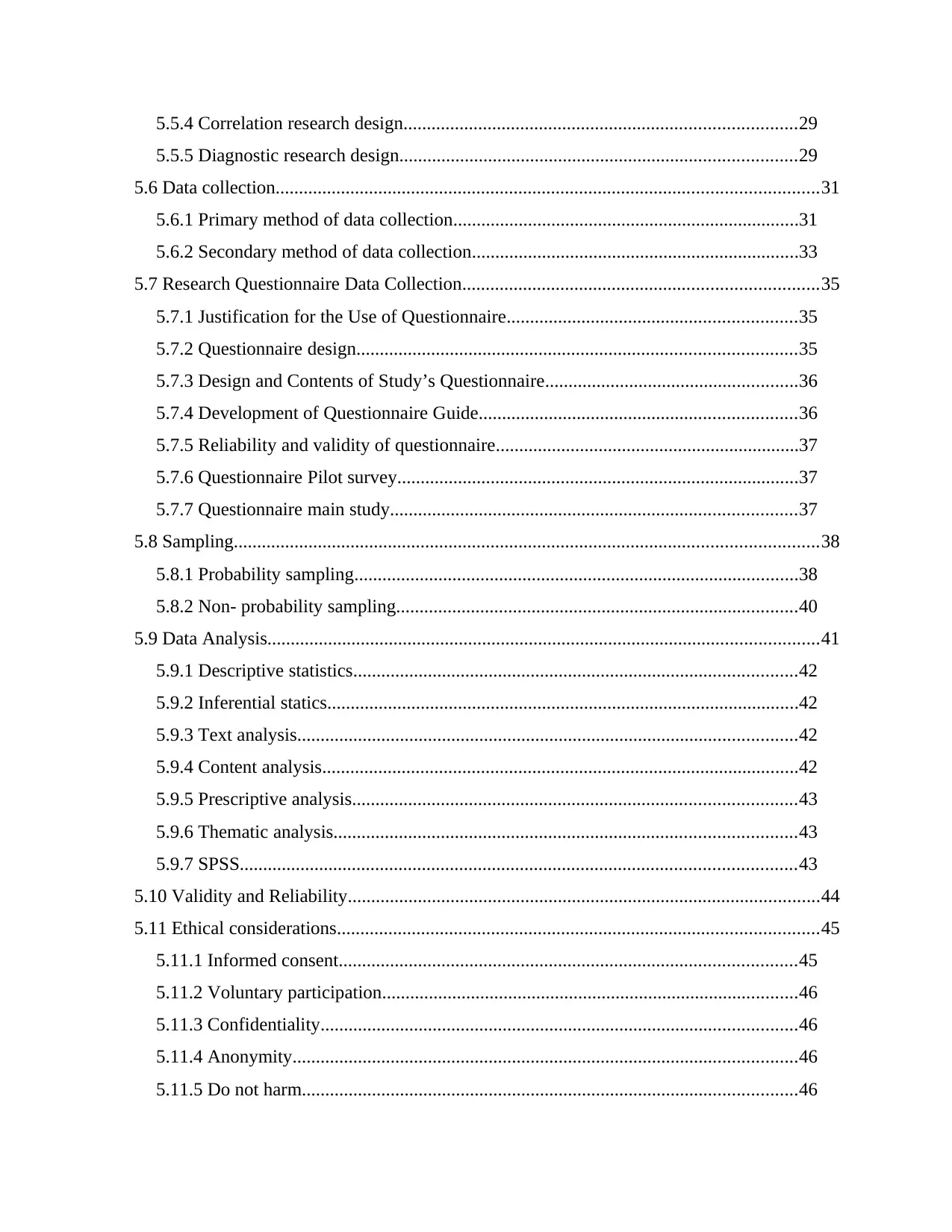
5.5.4 Correlation research design....................................................................................29
5.5.5 Diagnostic research design.....................................................................................29
5.6 Data collection....................................................................................................................31
5.6.1 Primary method of data collection..........................................................................31
5.6.2 Secondary method of data collection......................................................................33
5.7 Research Questionnaire Data Collection............................................................................35
5.7.1 Justification for the Use of Questionnaire..............................................................35
5.7.2 Questionnaire design..............................................................................................35
5.7.3 Design and Contents of Study’s Questionnaire......................................................36
5.7.4 Development of Questionnaire Guide....................................................................36
5.7.5 Reliability and validity of questionnaire.................................................................37
5.7.6 Questionnaire Pilot survey......................................................................................37
5.7.7 Questionnaire main study.......................................................................................37
5.8 Sampling.............................................................................................................................38
5.8.1 Probability sampling...............................................................................................38
5.8.2 Non- probability sampling......................................................................................40
5.9 Data Analysis......................................................................................................................41
5.9.1 Descriptive statistics...............................................................................................42
5.9.2 Inferential statics.....................................................................................................42
5.9.3 Text analysis...........................................................................................................42
5.9.4 Content analysis......................................................................................................42
5.9.5 Prescriptive analysis...............................................................................................43
5.9.6 Thematic analysis...................................................................................................43
5.9.7 SPSS.......................................................................................................................43
5.10 Validity and Reliability.....................................................................................................44
5.11 Ethical considerations.......................................................................................................45
5.11.1 Informed consent..................................................................................................45
5.11.2 Voluntary participation.........................................................................................46
5.11.3 Confidentiality......................................................................................................46
5.11.4 Anonymity............................................................................................................46
5.11.5 Do not harm..........................................................................................................46
5.5.5 Diagnostic research design.....................................................................................29
5.6 Data collection....................................................................................................................31
5.6.1 Primary method of data collection..........................................................................31
5.6.2 Secondary method of data collection......................................................................33
5.7 Research Questionnaire Data Collection............................................................................35
5.7.1 Justification for the Use of Questionnaire..............................................................35
5.7.2 Questionnaire design..............................................................................................35
5.7.3 Design and Contents of Study’s Questionnaire......................................................36
5.7.4 Development of Questionnaire Guide....................................................................36
5.7.5 Reliability and validity of questionnaire.................................................................37
5.7.6 Questionnaire Pilot survey......................................................................................37
5.7.7 Questionnaire main study.......................................................................................37
5.8 Sampling.............................................................................................................................38
5.8.1 Probability sampling...............................................................................................38
5.8.2 Non- probability sampling......................................................................................40
5.9 Data Analysis......................................................................................................................41
5.9.1 Descriptive statistics...............................................................................................42
5.9.2 Inferential statics.....................................................................................................42
5.9.3 Text analysis...........................................................................................................42
5.9.4 Content analysis......................................................................................................42
5.9.5 Prescriptive analysis...............................................................................................43
5.9.6 Thematic analysis...................................................................................................43
5.9.7 SPSS.......................................................................................................................43
5.10 Validity and Reliability.....................................................................................................44
5.11 Ethical considerations.......................................................................................................45
5.11.1 Informed consent..................................................................................................45
5.11.2 Voluntary participation.........................................................................................46
5.11.3 Confidentiality......................................................................................................46
5.11.4 Anonymity............................................................................................................46
5.11.5 Do not harm..........................................................................................................46
⊘ This is a preview!⊘
Do you want full access?
Subscribe today to unlock all pages.

Trusted by 1+ million students worldwide

5.11.6 Only assess relevant components.........................................................................46
Questionnaire 1: Effectiveness of women entrepreneurs and their contribution......................48
Questionnaire 2: Role of women entrepreneurs in economy of country..................................54
Questionnaire 3: Contribution of women empowerment towards SME in Andhra Pradesh....56
REFERENCES..............................................................................................................................59
Questionnaire 1: Effectiveness of women entrepreneurs and their contribution......................48
Questionnaire 2: Role of women entrepreneurs in economy of country..................................54
Questionnaire 3: Contribution of women empowerment towards SME in Andhra Pradesh....56
REFERENCES..............................................................................................................................59
Paraphrase This Document
Need a fresh take? Get an instant paraphrase of this document with our AI Paraphraser
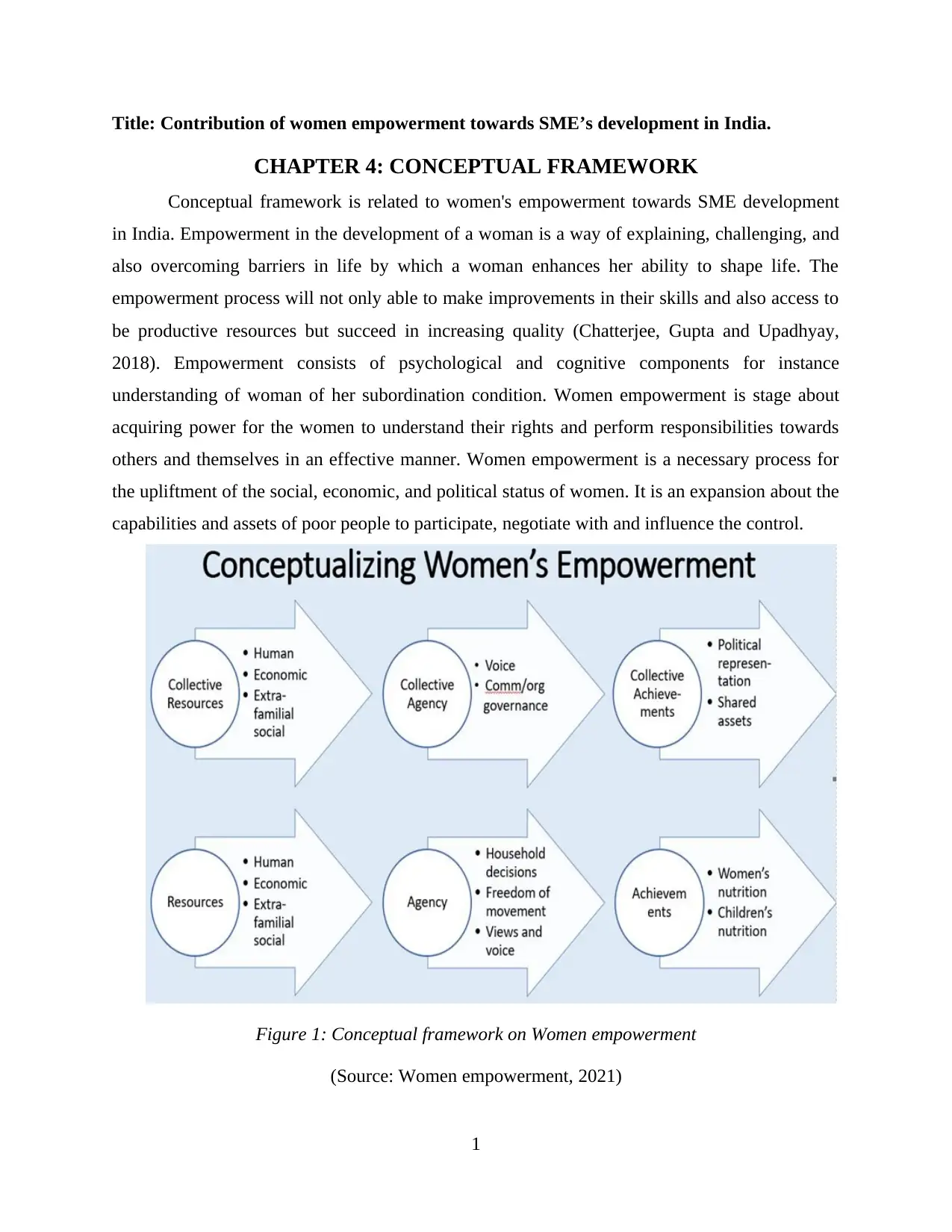
Title: Contribution of women empowerment towards SME’s development in India.
CHAPTER 4: CONCEPTUAL FRAMEWORK
Conceptual framework is related to women's empowerment towards SME development
in India. Empowerment in the development of a woman is a way of explaining, challenging, and
also overcoming barriers in life by which a woman enhances her ability to shape life. The
empowerment process will not only able to make improvements in their skills and also access to
be productive resources but succeed in increasing quality (Chatterjee, Gupta and Upadhyay,
2018). Empowerment consists of psychological and cognitive components for instance
understanding of woman of her subordination condition. Women empowerment is stage about
acquiring power for the women to understand their rights and perform responsibilities towards
others and themselves in an effective manner. Women empowerment is a necessary process for
the upliftment of the social, economic, and political status of women. It is an expansion about the
capabilities and assets of poor people to participate, negotiate with and influence the control.
Figure 1: Conceptual framework on Women empowerment
(Source: Women empowerment, 2021)
1
CHAPTER 4: CONCEPTUAL FRAMEWORK
Conceptual framework is related to women's empowerment towards SME development
in India. Empowerment in the development of a woman is a way of explaining, challenging, and
also overcoming barriers in life by which a woman enhances her ability to shape life. The
empowerment process will not only able to make improvements in their skills and also access to
be productive resources but succeed in increasing quality (Chatterjee, Gupta and Upadhyay,
2018). Empowerment consists of psychological and cognitive components for instance
understanding of woman of her subordination condition. Women empowerment is stage about
acquiring power for the women to understand their rights and perform responsibilities towards
others and themselves in an effective manner. Women empowerment is a necessary process for
the upliftment of the social, economic, and political status of women. It is an expansion about the
capabilities and assets of poor people to participate, negotiate with and influence the control.
Figure 1: Conceptual framework on Women empowerment
(Source: Women empowerment, 2021)
1
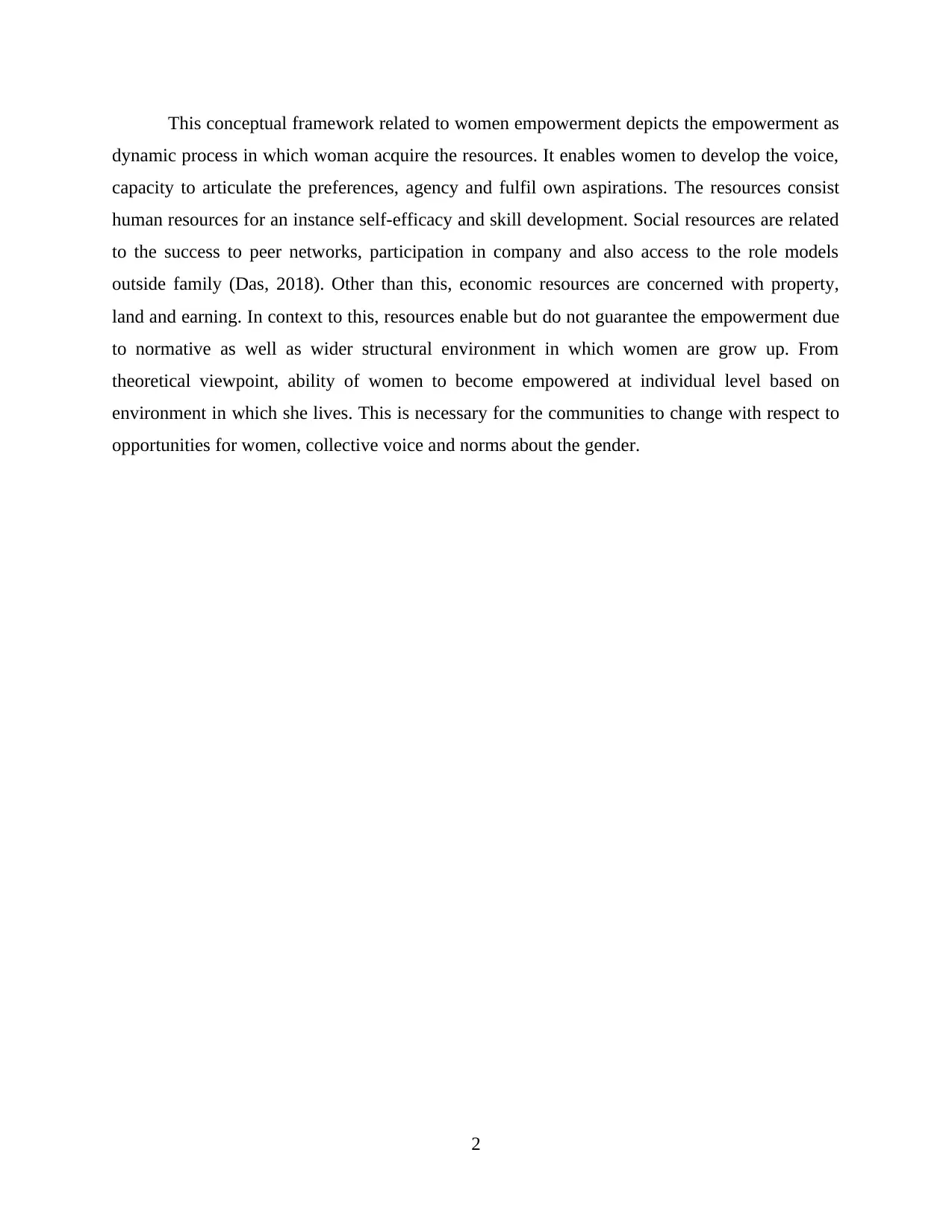
This conceptual framework related to women empowerment depicts the empowerment as
dynamic process in which woman acquire the resources. It enables women to develop the voice,
capacity to articulate the preferences, agency and fulfil own aspirations. The resources consist
human resources for an instance self-efficacy and skill development. Social resources are related
to the success to peer networks, participation in company and also access to the role models
outside family (Das, 2018). Other than this, economic resources are concerned with property,
land and earning. In context to this, resources enable but do not guarantee the empowerment due
to normative as well as wider structural environment in which women are grow up. From
theoretical viewpoint, ability of women to become empowered at individual level based on
environment in which she lives. This is necessary for the communities to change with respect to
opportunities for women, collective voice and norms about the gender.
2
dynamic process in which woman acquire the resources. It enables women to develop the voice,
capacity to articulate the preferences, agency and fulfil own aspirations. The resources consist
human resources for an instance self-efficacy and skill development. Social resources are related
to the success to peer networks, participation in company and also access to the role models
outside family (Das, 2018). Other than this, economic resources are concerned with property,
land and earning. In context to this, resources enable but do not guarantee the empowerment due
to normative as well as wider structural environment in which women are grow up. From
theoretical viewpoint, ability of women to become empowered at individual level based on
environment in which she lives. This is necessary for the communities to change with respect to
opportunities for women, collective voice and norms about the gender.
2
⊘ This is a preview!⊘
Do you want full access?
Subscribe today to unlock all pages.

Trusted by 1+ million students worldwide
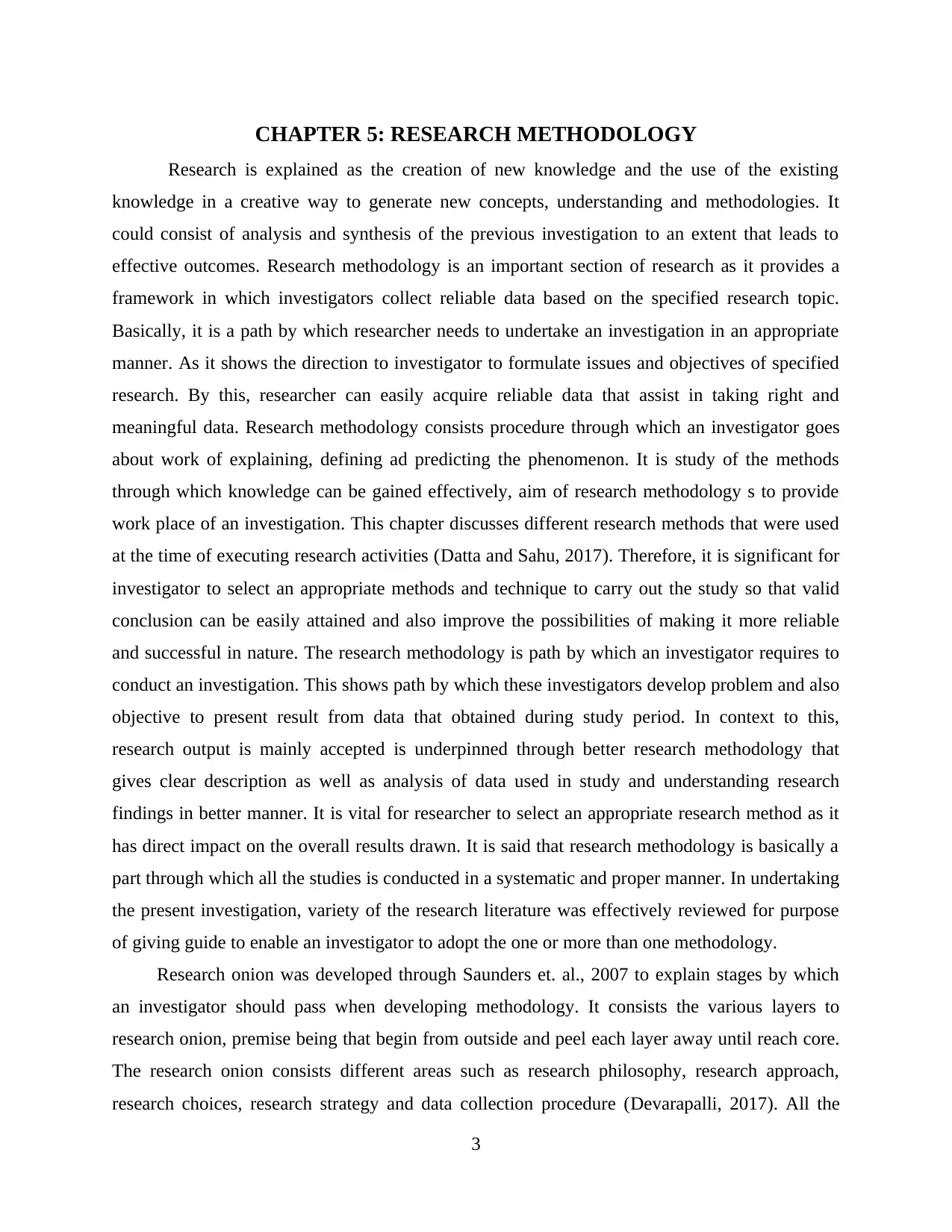
CHAPTER 5: RESEARCH METHODOLOGY
Research is explained as the creation of new knowledge and the use of the existing
knowledge in a creative way to generate new concepts, understanding and methodologies. It
could consist of analysis and synthesis of the previous investigation to an extent that leads to
effective outcomes. Research methodology is an important section of research as it provides a
framework in which investigators collect reliable data based on the specified research topic.
Basically, it is a path by which researcher needs to undertake an investigation in an appropriate
manner. As it shows the direction to investigator to formulate issues and objectives of specified
research. By this, researcher can easily acquire reliable data that assist in taking right and
meaningful data. Research methodology consists procedure through which an investigator goes
about work of explaining, defining ad predicting the phenomenon. It is study of the methods
through which knowledge can be gained effectively, aim of research methodology s to provide
work place of an investigation. This chapter discusses different research methods that were used
at the time of executing research activities (Datta and Sahu, 2017). Therefore, it is significant for
investigator to select an appropriate methods and technique to carry out the study so that valid
conclusion can be easily attained and also improve the possibilities of making it more reliable
and successful in nature. The research methodology is path by which an investigator requires to
conduct an investigation. This shows path by which these investigators develop problem and also
objective to present result from data that obtained during study period. In context to this,
research output is mainly accepted is underpinned through better research methodology that
gives clear description as well as analysis of data used in study and understanding research
findings in better manner. It is vital for researcher to select an appropriate research method as it
has direct impact on the overall results drawn. It is said that research methodology is basically a
part through which all the studies is conducted in a systematic and proper manner. In undertaking
the present investigation, variety of the research literature was effectively reviewed for purpose
of giving guide to enable an investigator to adopt the one or more than one methodology.
Research onion was developed through Saunders et. al., 2007 to explain stages by which
an investigator should pass when developing methodology. It consists the various layers to
research onion, premise being that begin from outside and peel each layer away until reach core.
The research onion consists different areas such as research philosophy, research approach,
research choices, research strategy and data collection procedure (Devarapalli, 2017). All the
3
Research is explained as the creation of new knowledge and the use of the existing
knowledge in a creative way to generate new concepts, understanding and methodologies. It
could consist of analysis and synthesis of the previous investigation to an extent that leads to
effective outcomes. Research methodology is an important section of research as it provides a
framework in which investigators collect reliable data based on the specified research topic.
Basically, it is a path by which researcher needs to undertake an investigation in an appropriate
manner. As it shows the direction to investigator to formulate issues and objectives of specified
research. By this, researcher can easily acquire reliable data that assist in taking right and
meaningful data. Research methodology consists procedure through which an investigator goes
about work of explaining, defining ad predicting the phenomenon. It is study of the methods
through which knowledge can be gained effectively, aim of research methodology s to provide
work place of an investigation. This chapter discusses different research methods that were used
at the time of executing research activities (Datta and Sahu, 2017). Therefore, it is significant for
investigator to select an appropriate methods and technique to carry out the study so that valid
conclusion can be easily attained and also improve the possibilities of making it more reliable
and successful in nature. The research methodology is path by which an investigator requires to
conduct an investigation. This shows path by which these investigators develop problem and also
objective to present result from data that obtained during study period. In context to this,
research output is mainly accepted is underpinned through better research methodology that
gives clear description as well as analysis of data used in study and understanding research
findings in better manner. It is vital for researcher to select an appropriate research method as it
has direct impact on the overall results drawn. It is said that research methodology is basically a
part through which all the studies is conducted in a systematic and proper manner. In undertaking
the present investigation, variety of the research literature was effectively reviewed for purpose
of giving guide to enable an investigator to adopt the one or more than one methodology.
Research onion was developed through Saunders et. al., 2007 to explain stages by which
an investigator should pass when developing methodology. It consists the various layers to
research onion, premise being that begin from outside and peel each layer away until reach core.
The research onion consists different areas such as research philosophy, research approach,
research choices, research strategy and data collection procedure (Devarapalli, 2017). All the
3
Paraphrase This Document
Need a fresh take? Get an instant paraphrase of this document with our AI Paraphraser
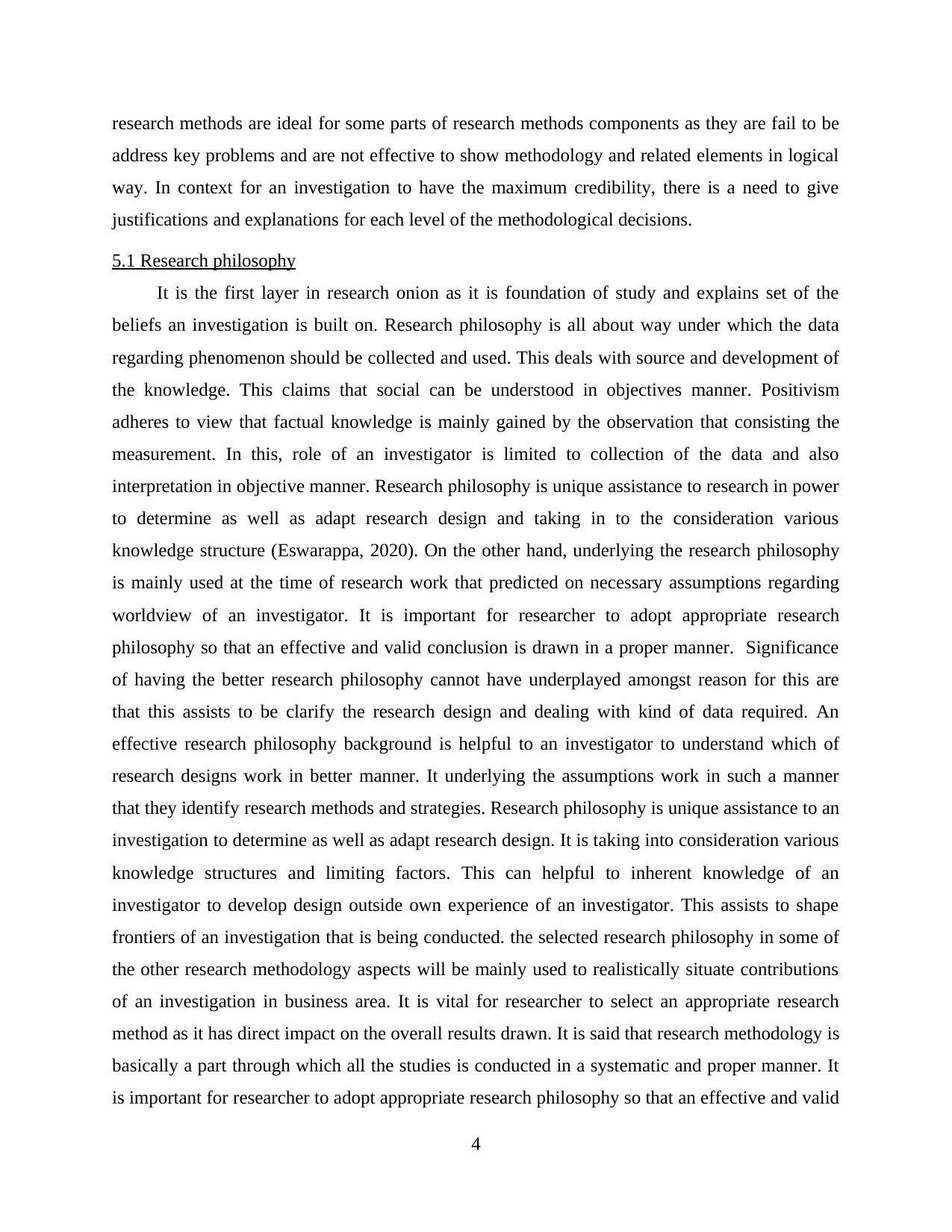
research methods are ideal for some parts of research methods components as they are fail to be
address key problems and are not effective to show methodology and related elements in logical
way. In context for an investigation to have the maximum credibility, there is a need to give
justifications and explanations for each level of the methodological decisions.
5.1 Research philosophy
It is the first layer in research onion as it is foundation of study and explains set of the
beliefs an investigation is built on. Research philosophy is all about way under which the data
regarding phenomenon should be collected and used. This deals with source and development of
the knowledge. This claims that social can be understood in objectives manner. Positivism
adheres to view that factual knowledge is mainly gained by the observation that consisting the
measurement. In this, role of an investigator is limited to collection of the data and also
interpretation in objective manner. Research philosophy is unique assistance to research in power
to determine as well as adapt research design and taking in to the consideration various
knowledge structure (Eswarappa, 2020). On the other hand, underlying the research philosophy
is mainly used at the time of research work that predicted on necessary assumptions regarding
worldview of an investigator. It is important for researcher to adopt appropriate research
philosophy so that an effective and valid conclusion is drawn in a proper manner. Significance
of having the better research philosophy cannot have underplayed amongst reason for this are
that this assists to be clarify the research design and dealing with kind of data required. An
effective research philosophy background is helpful to an investigator to understand which of
research designs work in better manner. It underlying the assumptions work in such a manner
that they identify research methods and strategies. Research philosophy is unique assistance to an
investigation to determine as well as adapt research design. It is taking into consideration various
knowledge structures and limiting factors. This can helpful to inherent knowledge of an
investigator to develop design outside own experience of an investigator. This assists to shape
frontiers of an investigation that is being conducted. the selected research philosophy in some of
the other research methodology aspects will be mainly used to realistically situate contributions
of an investigation in business area. It is vital for researcher to select an appropriate research
method as it has direct impact on the overall results drawn. It is said that research methodology is
basically a part through which all the studies is conducted in a systematic and proper manner. It
is important for researcher to adopt appropriate research philosophy so that an effective and valid
4
address key problems and are not effective to show methodology and related elements in logical
way. In context for an investigation to have the maximum credibility, there is a need to give
justifications and explanations for each level of the methodological decisions.
5.1 Research philosophy
It is the first layer in research onion as it is foundation of study and explains set of the
beliefs an investigation is built on. Research philosophy is all about way under which the data
regarding phenomenon should be collected and used. This deals with source and development of
the knowledge. This claims that social can be understood in objectives manner. Positivism
adheres to view that factual knowledge is mainly gained by the observation that consisting the
measurement. In this, role of an investigator is limited to collection of the data and also
interpretation in objective manner. Research philosophy is unique assistance to research in power
to determine as well as adapt research design and taking in to the consideration various
knowledge structure (Eswarappa, 2020). On the other hand, underlying the research philosophy
is mainly used at the time of research work that predicted on necessary assumptions regarding
worldview of an investigator. It is important for researcher to adopt appropriate research
philosophy so that an effective and valid conclusion is drawn in a proper manner. Significance
of having the better research philosophy cannot have underplayed amongst reason for this are
that this assists to be clarify the research design and dealing with kind of data required. An
effective research philosophy background is helpful to an investigator to understand which of
research designs work in better manner. It underlying the assumptions work in such a manner
that they identify research methods and strategies. Research philosophy is unique assistance to an
investigation to determine as well as adapt research design. It is taking into consideration various
knowledge structures and limiting factors. This can helpful to inherent knowledge of an
investigator to develop design outside own experience of an investigator. This assists to shape
frontiers of an investigation that is being conducted. the selected research philosophy in some of
the other research methodology aspects will be mainly used to realistically situate contributions
of an investigation in business area. It is vital for researcher to select an appropriate research
method as it has direct impact on the overall results drawn. It is said that research methodology is
basically a part through which all the studies is conducted in a systematic and proper manner. It
is important for researcher to adopt appropriate research philosophy so that an effective and valid
4
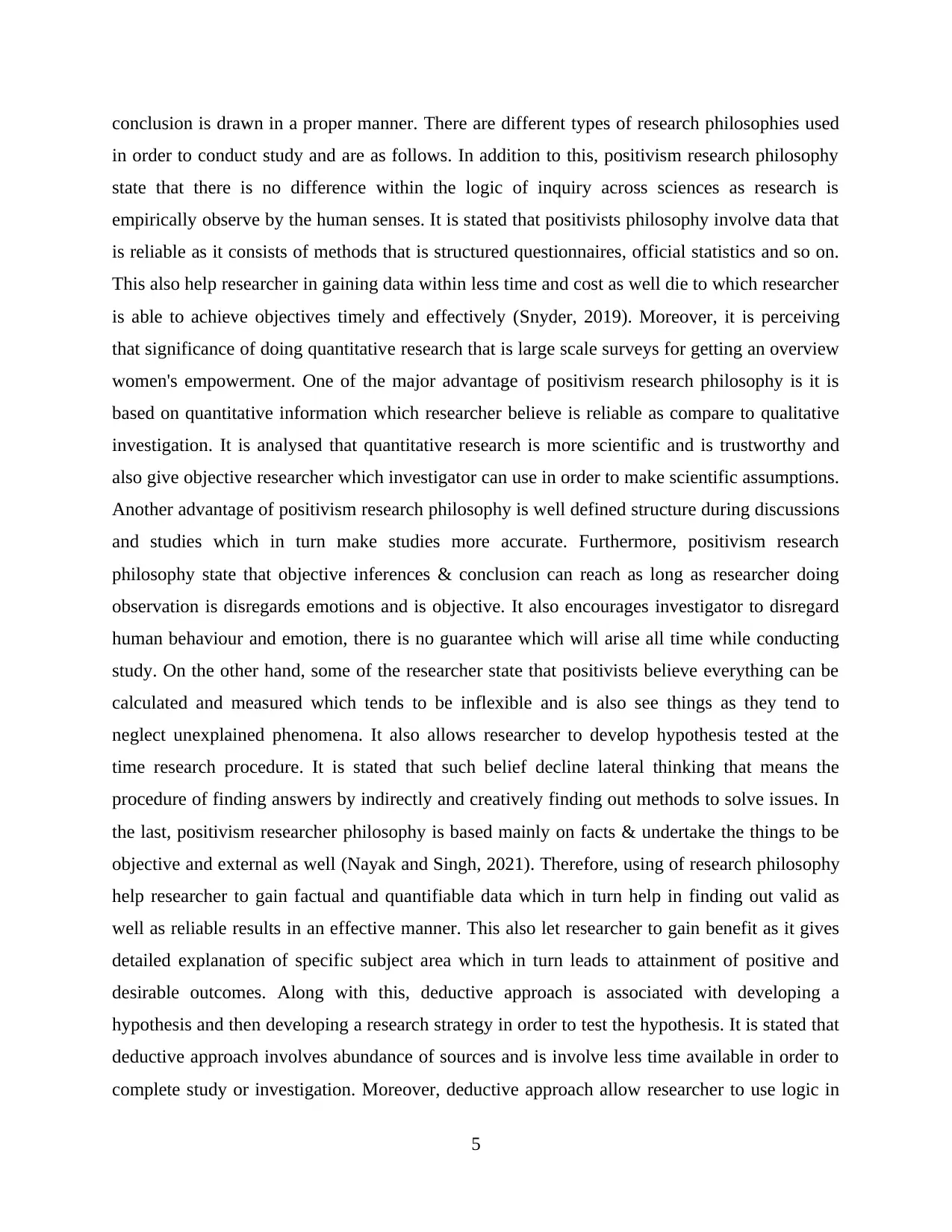
conclusion is drawn in a proper manner. There are different types of research philosophies used
in order to conduct study and are as follows. In addition to this, positivism research philosophy
state that there is no difference within the logic of inquiry across sciences as research is
empirically observe by the human senses. It is stated that positivists philosophy involve data that
is reliable as it consists of methods that is structured questionnaires, official statistics and so on.
This also help researcher in gaining data within less time and cost as well die to which researcher
is able to achieve objectives timely and effectively (Snyder, 2019). Moreover, it is perceiving
that significance of doing quantitative research that is large scale surveys for getting an overview
women's empowerment. One of the major advantage of positivism research philosophy is it is
based on quantitative information which researcher believe is reliable as compare to qualitative
investigation. It is analysed that quantitative research is more scientific and is trustworthy and
also give objective researcher which investigator can use in order to make scientific assumptions.
Another advantage of positivism research philosophy is well defined structure during discussions
and studies which in turn make studies more accurate. Furthermore, positivism research
philosophy state that objective inferences & conclusion can reach as long as researcher doing
observation is disregards emotions and is objective. It also encourages investigator to disregard
human behaviour and emotion, there is no guarantee which will arise all time while conducting
study. On the other hand, some of the researcher state that positivists believe everything can be
calculated and measured which tends to be inflexible and is also see things as they tend to
neglect unexplained phenomena. It also allows researcher to develop hypothesis tested at the
time research procedure. It is stated that such belief decline lateral thinking that means the
procedure of finding answers by indirectly and creatively finding out methods to solve issues. In
the last, positivism researcher philosophy is based mainly on facts & undertake the things to be
objective and external as well (Nayak and Singh, 2021). Therefore, using of research philosophy
help researcher to gain factual and quantifiable data which in turn help in finding out valid as
well as reliable results in an effective manner. This also let researcher to gain benefit as it gives
detailed explanation of specific subject area which in turn leads to attainment of positive and
desirable outcomes. Along with this, deductive approach is associated with developing a
hypothesis and then developing a research strategy in order to test the hypothesis. It is stated that
deductive approach involves abundance of sources and is involve less time available in order to
complete study or investigation. Moreover, deductive approach allow researcher to use logic in
5
in order to conduct study and are as follows. In addition to this, positivism research philosophy
state that there is no difference within the logic of inquiry across sciences as research is
empirically observe by the human senses. It is stated that positivists philosophy involve data that
is reliable as it consists of methods that is structured questionnaires, official statistics and so on.
This also help researcher in gaining data within less time and cost as well die to which researcher
is able to achieve objectives timely and effectively (Snyder, 2019). Moreover, it is perceiving
that significance of doing quantitative research that is large scale surveys for getting an overview
women's empowerment. One of the major advantage of positivism research philosophy is it is
based on quantitative information which researcher believe is reliable as compare to qualitative
investigation. It is analysed that quantitative research is more scientific and is trustworthy and
also give objective researcher which investigator can use in order to make scientific assumptions.
Another advantage of positivism research philosophy is well defined structure during discussions
and studies which in turn make studies more accurate. Furthermore, positivism research
philosophy state that objective inferences & conclusion can reach as long as researcher doing
observation is disregards emotions and is objective. It also encourages investigator to disregard
human behaviour and emotion, there is no guarantee which will arise all time while conducting
study. On the other hand, some of the researcher state that positivists believe everything can be
calculated and measured which tends to be inflexible and is also see things as they tend to
neglect unexplained phenomena. It also allows researcher to develop hypothesis tested at the
time research procedure. It is stated that such belief decline lateral thinking that means the
procedure of finding answers by indirectly and creatively finding out methods to solve issues. In
the last, positivism researcher philosophy is based mainly on facts & undertake the things to be
objective and external as well (Nayak and Singh, 2021). Therefore, using of research philosophy
help researcher to gain factual and quantifiable data which in turn help in finding out valid as
well as reliable results in an effective manner. This also let researcher to gain benefit as it gives
detailed explanation of specific subject area which in turn leads to attainment of positive and
desirable outcomes. Along with this, deductive approach is associated with developing a
hypothesis and then developing a research strategy in order to test the hypothesis. It is stated that
deductive approach involves abundance of sources and is involve less time available in order to
complete study or investigation. Moreover, deductive approach allow researcher to use logic in
5
⊘ This is a preview!⊘
Do you want full access?
Subscribe today to unlock all pages.

Trusted by 1+ million students worldwide
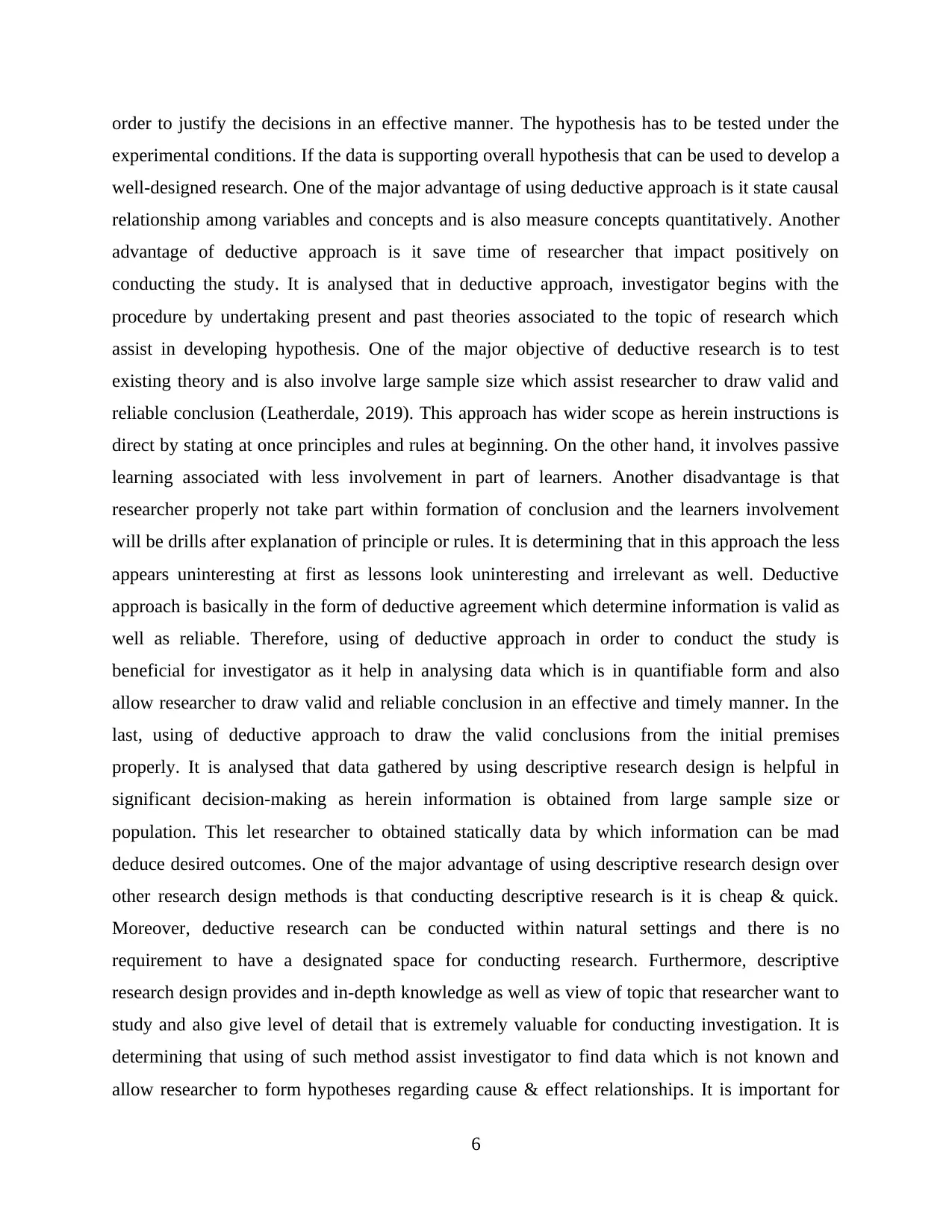
order to justify the decisions in an effective manner. The hypothesis has to be tested under the
experimental conditions. If the data is supporting overall hypothesis that can be used to develop a
well-designed research. One of the major advantage of using deductive approach is it state causal
relationship among variables and concepts and is also measure concepts quantitatively. Another
advantage of deductive approach is it save time of researcher that impact positively on
conducting the study. It is analysed that in deductive approach, investigator begins with the
procedure by undertaking present and past theories associated to the topic of research which
assist in developing hypothesis. One of the major objective of deductive research is to test
existing theory and is also involve large sample size which assist researcher to draw valid and
reliable conclusion (Leatherdale, 2019). This approach has wider scope as herein instructions is
direct by stating at once principles and rules at beginning. On the other hand, it involves passive
learning associated with less involvement in part of learners. Another disadvantage is that
researcher properly not take part within formation of conclusion and the learners involvement
will be drills after explanation of principle or rules. It is determining that in this approach the less
appears uninteresting at first as lessons look uninteresting and irrelevant as well. Deductive
approach is basically in the form of deductive agreement which determine information is valid as
well as reliable. Therefore, using of deductive approach in order to conduct the study is
beneficial for investigator as it help in analysing data which is in quantifiable form and also
allow researcher to draw valid and reliable conclusion in an effective and timely manner. In the
last, using of deductive approach to draw the valid conclusions from the initial premises
properly. It is analysed that data gathered by using descriptive research design is helpful in
significant decision-making as herein information is obtained from large sample size or
population. This let researcher to obtained statically data by which information can be mad
deduce desired outcomes. One of the major advantage of using descriptive research design over
other research design methods is that conducting descriptive research is it is cheap & quick.
Moreover, deductive research can be conducted within natural settings and there is no
requirement to have a designated space for conducting research. Furthermore, descriptive
research design provides and in-depth knowledge as well as view of topic that researcher want to
study and also give level of detail that is extremely valuable for conducting investigation. It is
determining that using of such method assist investigator to find data which is not known and
allow researcher to form hypotheses regarding cause & effect relationships. It is important for
6
experimental conditions. If the data is supporting overall hypothesis that can be used to develop a
well-designed research. One of the major advantage of using deductive approach is it state causal
relationship among variables and concepts and is also measure concepts quantitatively. Another
advantage of deductive approach is it save time of researcher that impact positively on
conducting the study. It is analysed that in deductive approach, investigator begins with the
procedure by undertaking present and past theories associated to the topic of research which
assist in developing hypothesis. One of the major objective of deductive research is to test
existing theory and is also involve large sample size which assist researcher to draw valid and
reliable conclusion (Leatherdale, 2019). This approach has wider scope as herein instructions is
direct by stating at once principles and rules at beginning. On the other hand, it involves passive
learning associated with less involvement in part of learners. Another disadvantage is that
researcher properly not take part within formation of conclusion and the learners involvement
will be drills after explanation of principle or rules. It is determining that in this approach the less
appears uninteresting at first as lessons look uninteresting and irrelevant as well. Deductive
approach is basically in the form of deductive agreement which determine information is valid as
well as reliable. Therefore, using of deductive approach in order to conduct the study is
beneficial for investigator as it help in analysing data which is in quantifiable form and also
allow researcher to draw valid and reliable conclusion in an effective and timely manner. In the
last, using of deductive approach to draw the valid conclusions from the initial premises
properly. It is analysed that data gathered by using descriptive research design is helpful in
significant decision-making as herein information is obtained from large sample size or
population. This let researcher to obtained statically data by which information can be mad
deduce desired outcomes. One of the major advantage of using descriptive research design over
other research design methods is that conducting descriptive research is it is cheap & quick.
Moreover, deductive research can be conducted within natural settings and there is no
requirement to have a designated space for conducting research. Furthermore, descriptive
research design provides and in-depth knowledge as well as view of topic that researcher want to
study and also give level of detail that is extremely valuable for conducting investigation. It is
determining that using of such method assist investigator to find data which is not known and
allow researcher to form hypotheses regarding cause & effect relationships. It is important for
6
Paraphrase This Document
Need a fresh take? Get an instant paraphrase of this document with our AI Paraphraser
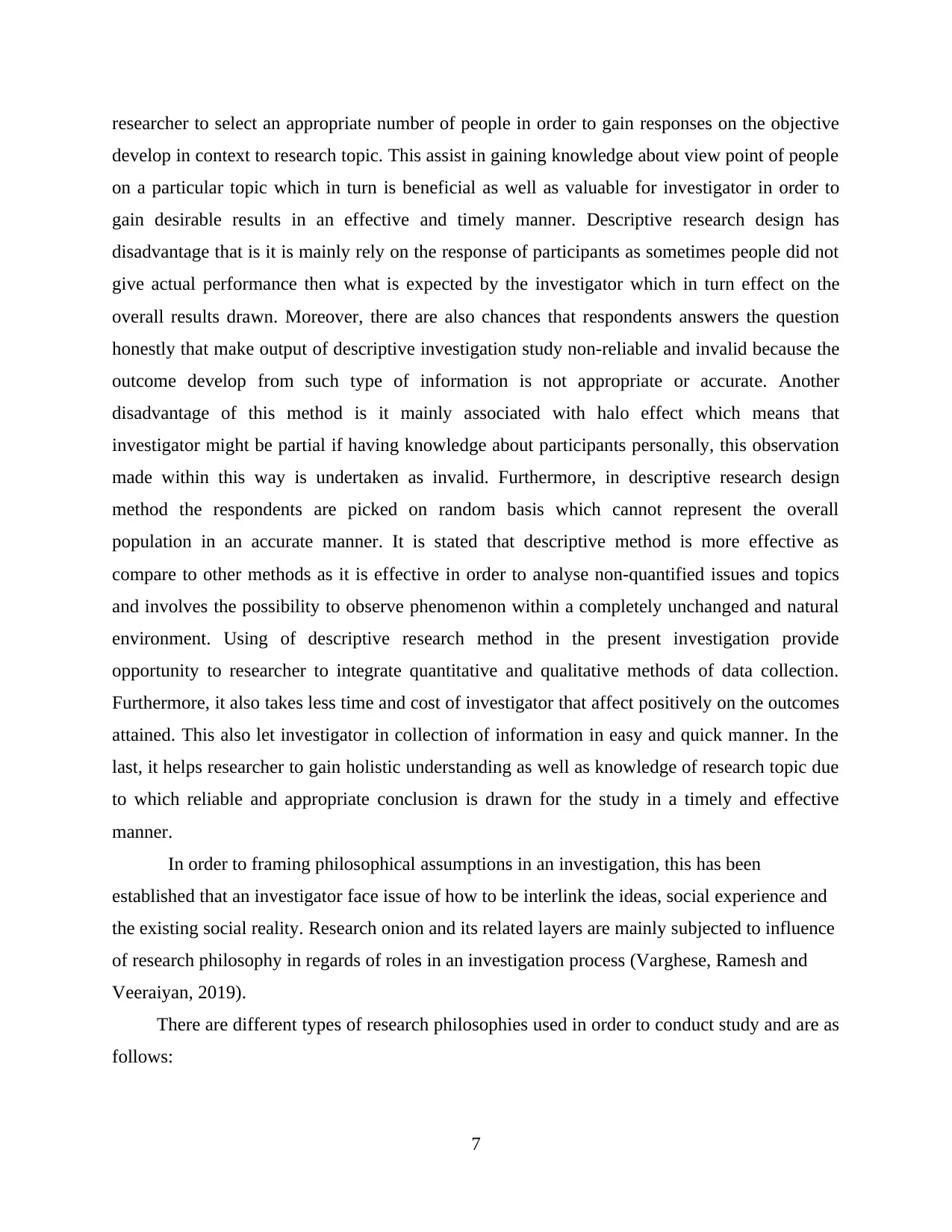
researcher to select an appropriate number of people in order to gain responses on the objective
develop in context to research topic. This assist in gaining knowledge about view point of people
on a particular topic which in turn is beneficial as well as valuable for investigator in order to
gain desirable results in an effective and timely manner. Descriptive research design has
disadvantage that is it is mainly rely on the response of participants as sometimes people did not
give actual performance then what is expected by the investigator which in turn effect on the
overall results drawn. Moreover, there are also chances that respondents answers the question
honestly that make output of descriptive investigation study non-reliable and invalid because the
outcome develop from such type of information is not appropriate or accurate. Another
disadvantage of this method is it mainly associated with halo effect which means that
investigator might be partial if having knowledge about participants personally, this observation
made within this way is undertaken as invalid. Furthermore, in descriptive research design
method the respondents are picked on random basis which cannot represent the overall
population in an accurate manner. It is stated that descriptive method is more effective as
compare to other methods as it is effective in order to analyse non-quantified issues and topics
and involves the possibility to observe phenomenon within a completely unchanged and natural
environment. Using of descriptive research method in the present investigation provide
opportunity to researcher to integrate quantitative and qualitative methods of data collection.
Furthermore, it also takes less time and cost of investigator that affect positively on the outcomes
attained. This also let investigator in collection of information in easy and quick manner. In the
last, it helps researcher to gain holistic understanding as well as knowledge of research topic due
to which reliable and appropriate conclusion is drawn for the study in a timely and effective
manner.
In order to framing philosophical assumptions in an investigation, this has been
established that an investigator face issue of how to be interlink the ideas, social experience and
the existing social reality. Research onion and its related layers are mainly subjected to influence
of research philosophy in regards of roles in an investigation process (Varghese, Ramesh and
Veeraiyan, 2019).
There are different types of research philosophies used in order to conduct study and are as
follows:
7
develop in context to research topic. This assist in gaining knowledge about view point of people
on a particular topic which in turn is beneficial as well as valuable for investigator in order to
gain desirable results in an effective and timely manner. Descriptive research design has
disadvantage that is it is mainly rely on the response of participants as sometimes people did not
give actual performance then what is expected by the investigator which in turn effect on the
overall results drawn. Moreover, there are also chances that respondents answers the question
honestly that make output of descriptive investigation study non-reliable and invalid because the
outcome develop from such type of information is not appropriate or accurate. Another
disadvantage of this method is it mainly associated with halo effect which means that
investigator might be partial if having knowledge about participants personally, this observation
made within this way is undertaken as invalid. Furthermore, in descriptive research design
method the respondents are picked on random basis which cannot represent the overall
population in an accurate manner. It is stated that descriptive method is more effective as
compare to other methods as it is effective in order to analyse non-quantified issues and topics
and involves the possibility to observe phenomenon within a completely unchanged and natural
environment. Using of descriptive research method in the present investigation provide
opportunity to researcher to integrate quantitative and qualitative methods of data collection.
Furthermore, it also takes less time and cost of investigator that affect positively on the outcomes
attained. This also let investigator in collection of information in easy and quick manner. In the
last, it helps researcher to gain holistic understanding as well as knowledge of research topic due
to which reliable and appropriate conclusion is drawn for the study in a timely and effective
manner.
In order to framing philosophical assumptions in an investigation, this has been
established that an investigator face issue of how to be interlink the ideas, social experience and
the existing social reality. Research onion and its related layers are mainly subjected to influence
of research philosophy in regards of roles in an investigation process (Varghese, Ramesh and
Veeraiyan, 2019).
There are different types of research philosophies used in order to conduct study and are as
follows:
7
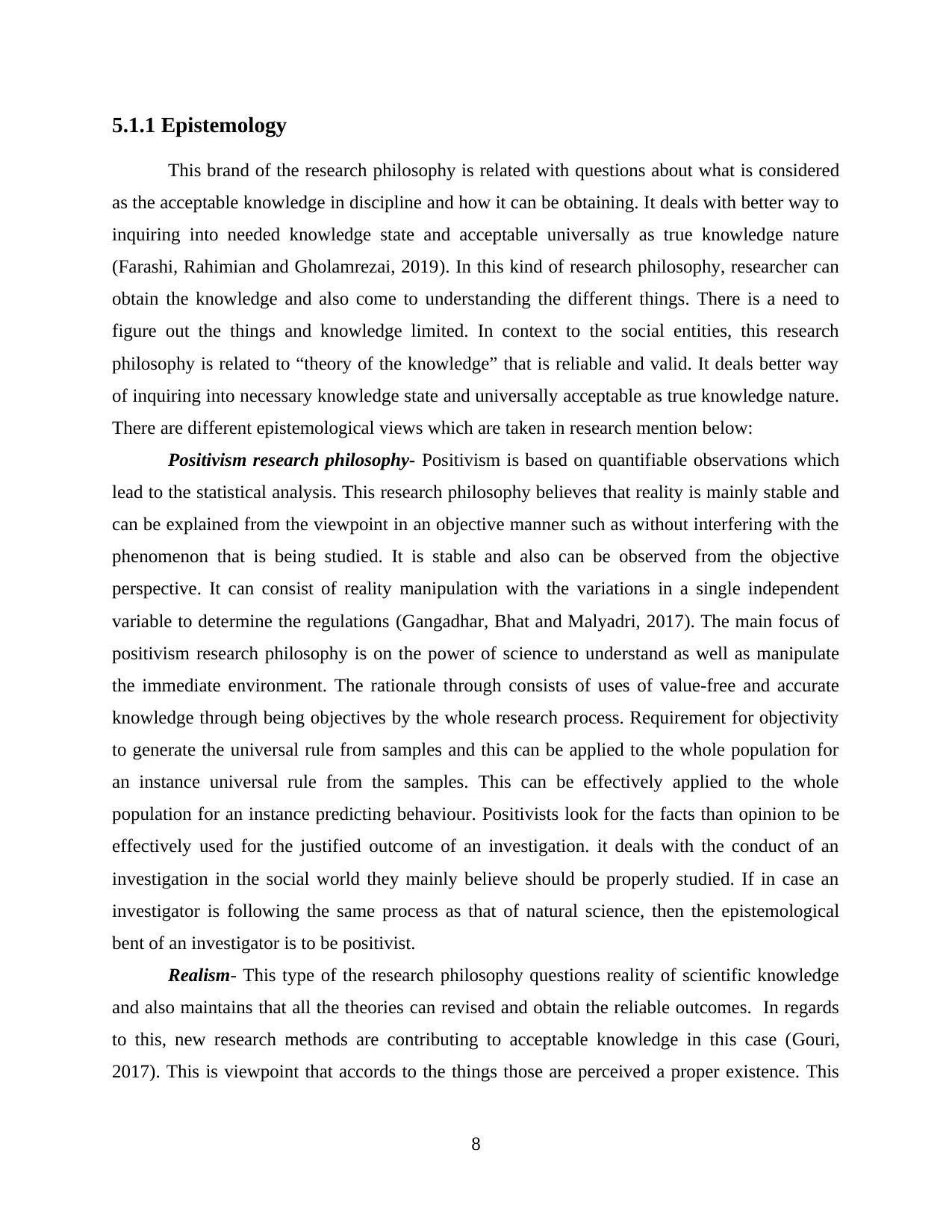
5.1.1 Epistemology
This brand of the research philosophy is related with questions about what is considered
as the acceptable knowledge in discipline and how it can be obtaining. It deals with better way to
inquiring into needed knowledge state and acceptable universally as true knowledge nature
(Farashi, Rahimian and Gholamrezai, 2019). In this kind of research philosophy, researcher can
obtain the knowledge and also come to understanding the different things. There is a need to
figure out the things and knowledge limited. In context to the social entities, this research
philosophy is related to “theory of the knowledge” that is reliable and valid. It deals better way
of inquiring into necessary knowledge state and universally acceptable as true knowledge nature.
There are different epistemological views which are taken in research mention below:
Positivism research philosophy- Positivism is based on quantifiable observations which
lead to the statistical analysis. This research philosophy believes that reality is mainly stable and
can be explained from the viewpoint in an objective manner such as without interfering with the
phenomenon that is being studied. It is stable and also can be observed from the objective
perspective. It can consist of reality manipulation with the variations in a single independent
variable to determine the regulations (Gangadhar, Bhat and Malyadri, 2017). The main focus of
positivism research philosophy is on the power of science to understand as well as manipulate
the immediate environment. The rationale through consists of uses of value-free and accurate
knowledge through being objectives by the whole research process. Requirement for objectivity
to generate the universal rule from samples and this can be applied to the whole population for
an instance universal rule from the samples. This can be effectively applied to the whole
population for an instance predicting behaviour. Positivists look for the facts than opinion to be
effectively used for the justified outcome of an investigation. it deals with the conduct of an
investigation in the social world they mainly believe should be properly studied. If in case an
investigator is following the same process as that of natural science, then the epistemological
bent of an investigator is to be positivist.
Realism- This type of the research philosophy questions reality of scientific knowledge
and also maintains that all the theories can revised and obtain the reliable outcomes. In regards
to this, new research methods are contributing to acceptable knowledge in this case (Gouri,
2017). This is viewpoint that accords to the things those are perceived a proper existence. This
8
This brand of the research philosophy is related with questions about what is considered
as the acceptable knowledge in discipline and how it can be obtaining. It deals with better way to
inquiring into needed knowledge state and acceptable universally as true knowledge nature
(Farashi, Rahimian and Gholamrezai, 2019). In this kind of research philosophy, researcher can
obtain the knowledge and also come to understanding the different things. There is a need to
figure out the things and knowledge limited. In context to the social entities, this research
philosophy is related to “theory of the knowledge” that is reliable and valid. It deals better way
of inquiring into necessary knowledge state and universally acceptable as true knowledge nature.
There are different epistemological views which are taken in research mention below:
Positivism research philosophy- Positivism is based on quantifiable observations which
lead to the statistical analysis. This research philosophy believes that reality is mainly stable and
can be explained from the viewpoint in an objective manner such as without interfering with the
phenomenon that is being studied. It is stable and also can be observed from the objective
perspective. It can consist of reality manipulation with the variations in a single independent
variable to determine the regulations (Gangadhar, Bhat and Malyadri, 2017). The main focus of
positivism research philosophy is on the power of science to understand as well as manipulate
the immediate environment. The rationale through consists of uses of value-free and accurate
knowledge through being objectives by the whole research process. Requirement for objectivity
to generate the universal rule from samples and this can be applied to the whole population for
an instance universal rule from the samples. This can be effectively applied to the whole
population for an instance predicting behaviour. Positivists look for the facts than opinion to be
effectively used for the justified outcome of an investigation. it deals with the conduct of an
investigation in the social world they mainly believe should be properly studied. If in case an
investigator is following the same process as that of natural science, then the epistemological
bent of an investigator is to be positivist.
Realism- This type of the research philosophy questions reality of scientific knowledge
and also maintains that all the theories can revised and obtain the reliable outcomes. In regards
to this, new research methods are contributing to acceptable knowledge in this case (Gouri,
2017). This is viewpoint that accords to the things those are perceived a proper existence. This
8
⊘ This is a preview!⊘
Do you want full access?
Subscribe today to unlock all pages.

Trusted by 1+ million students worldwide
1 out of 67
Related Documents
Your All-in-One AI-Powered Toolkit for Academic Success.
+13062052269
info@desklib.com
Available 24*7 on WhatsApp / Email
![[object Object]](/_next/static/media/star-bottom.7253800d.svg)
Unlock your academic potential
Copyright © 2020–2026 A2Z Services. All Rights Reserved. Developed and managed by ZUCOL.





